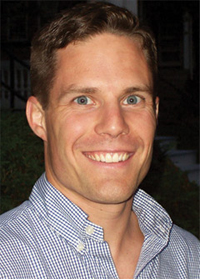A Map of the Bacterial World
Timothy Gardner, an ENG assistant professor of biomedical engineering, is studying the metabolism of E. coli.

The bacterium E. coli is among the most-studied organisms on Earth, but there are still secrets to explore. Timothy Gardner (ENG’00), a College of Engineering assistant professor of biomedical engineering, has for the first time mapped more than 1,000 interactions in the cell’s regulatory network, potentially opening the window to understanding how bacteria mutate and develop resistance to antibiotics.
Bacteria resist antibiotics because they have strong survival skills, Gardner says. “They respond to varying conditions, nutrients, toxins, stresses, and competition from different organisms in constantly varying environments by basically changing their metabolic program,” he says. “The system that orchestrates these responses is not a trivial system. It is actually hundreds of genes that are connected in an interdependent network.”
In a study published in the journal PLoS Biology, Gardner and his research team looked at existing models of metabolism in E. coli, then came up with an algorithm to make predictions about what would happen if they tweaked a cell. They collected data sets on about two million data points detailing E. coli genes and regulatory interactions between them, then ran the data through the algorithm. “By studying precisely all the things that come out, you can infer what’s actually inside the black box,” says Gardner, who was recently elected to the governing council for the Institute for Biological Engineering.

The researchers found that their algorithm exceeded the accuracy of existing models by about 40 percent. “It could predict regulatory interactions from the data with about 80 percent confidence, so about 8 out of 10 predictions were correct,” says Gardner. “For computational work in biology, that’s an extremely good performance.”
Having proved with E. coli that the algorithm could calibrate the control system, the researchers are now expanding their data set to try to map microbial interactions in other bacteria. As Gardner explains it, their approach is like using a satellite to map a coastline rather than sailing a boat around it.
So far, the research team has targeted pathways of virulence or infection, coordinated group action, and antibiotic tolerance. The researchers disturb the physiological mechanisms to induce group responses, examine virulence expression and responses, and then mix those responses with different types of stresses and environmental conditions to see if there is a relationship between them. They also plan to do antibiotic studies where they start to treat the virulence with combinations of antibiotics to see how those responses interact with the virulence pathways.
This article was originally published on the College of Engineering Web site.